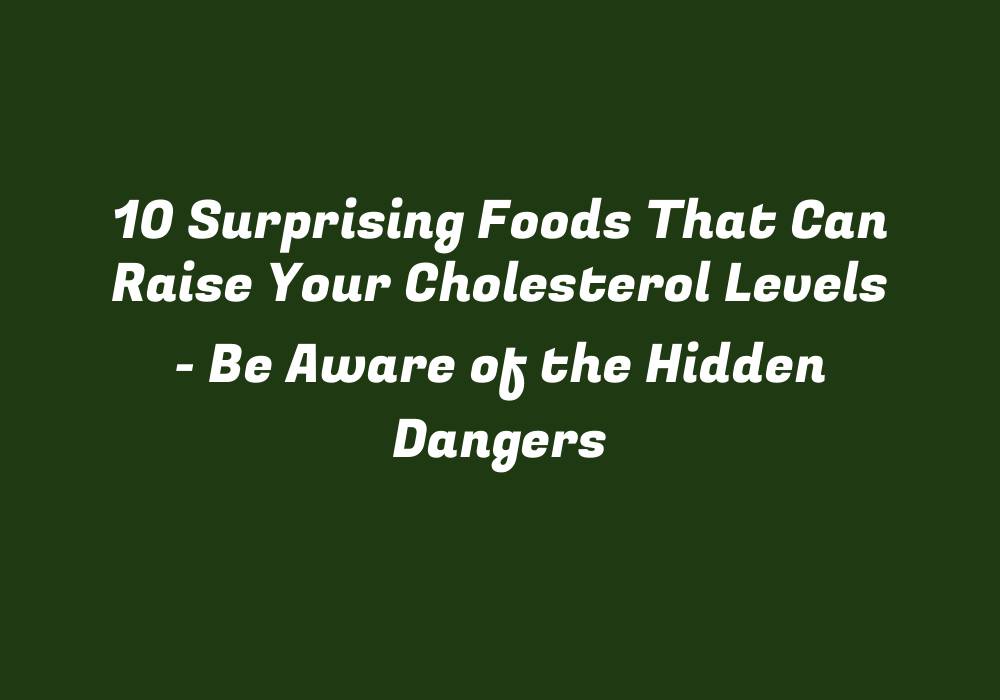Uncover the Surprising Foods That Can Affect Your Cholesterol Levels
It is a well-known fact that high cholesterol levels can lead to serious health issues like heart disease and stroke. Many people are aware of the importance of reducing unhealthy fats, trans fats, and saturated fats in their diets to control cholesterol levels. However, some foods may not be as obvious when it comes to raising cholesterol. Here is a list of 10 surprising foods that can affect your cholesterol levels and the hidden dangers you need to be aware of.
1. Pastries and Baked Goods
Pastries, doughnuts, muffins, and other baked goods are loaded with unhealthy fats due to their high-fat content in the form of butter, shortening, or oil. They may also contain added sugar that can contribute to inflammation and increase LDL (bad) cholesterol levels. Opt for healthier alternatives like whole grain baked goods made without excessive amounts of saturated fats.
2. Fried Foods
Fried foods, such as french fries, chicken tenders, and onion rings, are notorious for their high fat content. The deep-frying process involves immersion in oil, which leads to the absorption of significant amounts of unhealthy fats. Choose grilled or baked alternatives to reduce your intake of saturated and trans fats.
3. Red Meat
Red meat is a rich source of saturated fat, which can raise LDL cholesterol levels when consumed excessively. It is important to limit the amount of red meat in your diet and opt for leaner options like chicken or fish instead. Additionally, choose grass-fed beef over conventionally raised options as it tends to have a higher content of healthy fats and fewer saturated fats.
4. Sugary Drinks
Soda, fruit juices, energy drinks, and sports beverages can all contain high amounts of added sugar and sweeteners that contribute to an increased risk of heart disease. Artificial sweeteners may also elevate LDL cholesterol levels, leading to the development of metabolic syndrome. Limit your intake of sugary drinks or choose unsweetened options like water for better heart health.
5. Organ Meats
Organ meats, such as liver and kidneys, are high in cholesterol content. While these foods offer important nutrients, over-consuming them can lead to higher levels of LDL cholesterol in the bloodstream. It is recommended to limit your intake or consider alternative sources of nutrients.
6. Margarine
Margarine used to be a popular spread, but it is now known for its high trans fat content. Trans fats are notoriously harmful to heart health and can raise LDL cholesterol levels. Choose alternatives like olive oil or avocado-based spreads with no added trans fats or hydrogenated oils.
7. Coconut Oil
Although coconut oil is touted for its many health benefits, it is high in saturated fat content and may raise LDL cholesterol levels when consumed excessively. Moderate consumption of this oil is advisable to prevent potential adverse effects on your heart health.
8. Commercial Baked Goods and Snacks
Many commercially prepared baked goods and snacks contain high amounts of trans fats, saturated fats, or refined carbohydrates that can raise cholesterol levels. Check the nutrition labels for hidden fats and sugars and opt for healthier alternatives whenever possible.
9. Dairy Products
Full-fat dairy products are often high in saturated fat, which can contribute to increased cholesterol levels if consumed in excess. Opt for low-fat or non-fat dairy alternatives to reduce your intake of harmful fats while still getting the necessary nutrients from these food sources.
10. Processed Meats
Processed meats like sausages, bacon, and deli meats often contain high amounts of saturated fat and sodium, which can negatively impact heart health. Limit your consumption of processed meat items to keep cholesterol levels in check.
In conclusion, being aware of these surprising foods and their effects on your cholesterol levels is essential for maintaining a healthy heart. By making conscious food choices and limiting or avoiding these high-cholesterol culprits, you can significantly reduce your risk of developing heart disease. Remember to always check nutrition labels, consume a well-balanced diet, and consult with a healthcare professional if you have any concerns about your cholesterol levels.
